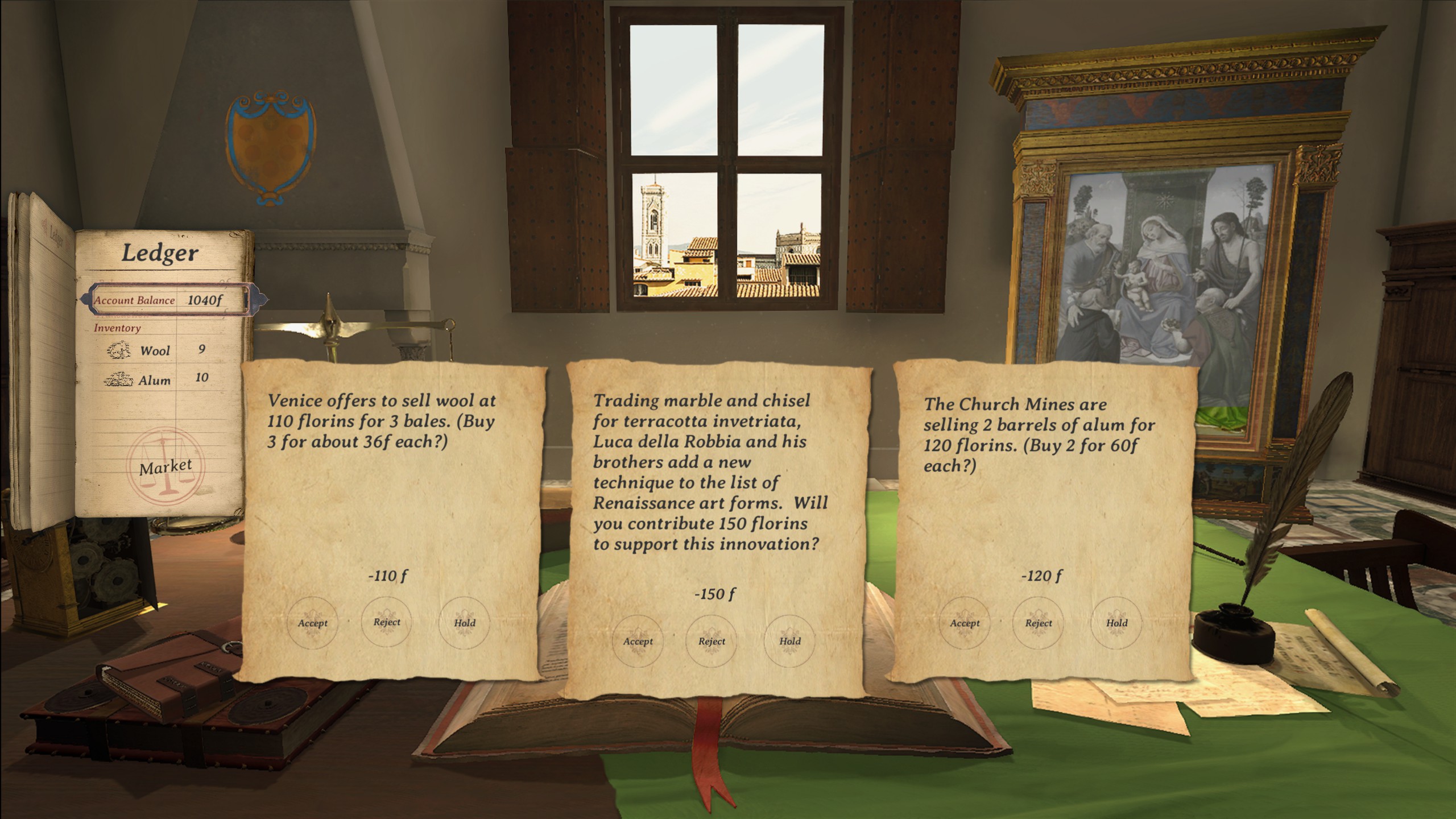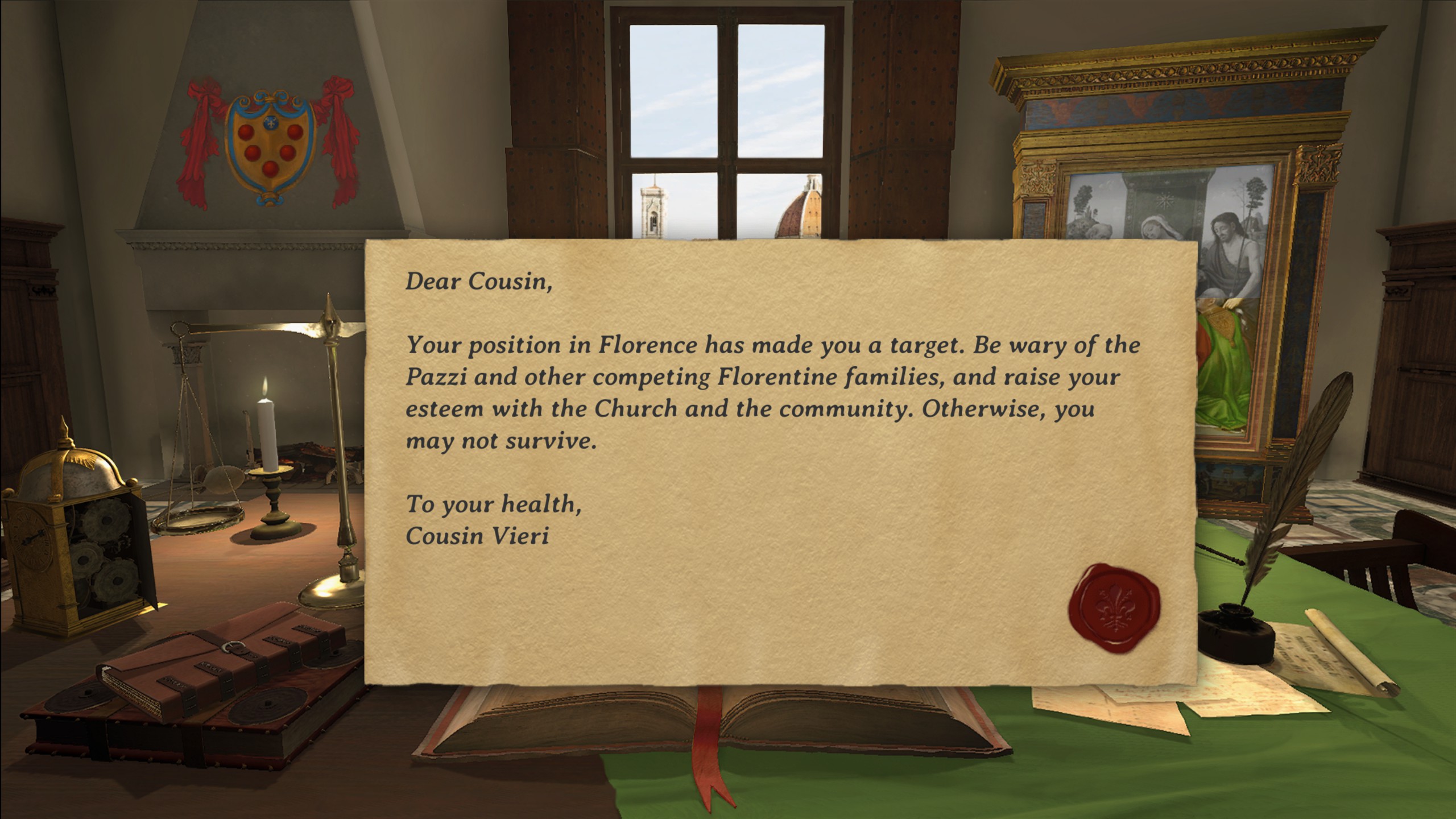Search
[{{{type}}}] {{{reason}}}
{{/data.error.root_cause}}{{{_source.title}}} {{#_source.showPrice}} {{{_source.displayPrice}}} {{/_source.showPrice}}
{{#_source.showLink}} {{/_source.showLink}} {{#_source.showDate}}{{{_source.displayDate}}}
{{/_source.showDate}}{{{_source.description}}}
{{#_source.additionalInfo}}{{#_source.additionalFields}} {{#title}} {{{label}}}: {{{title}}} {{/title}} {{/_source.additionalFields}}
{{/_source.additionalInfo}}- Details
- Category: Computer
- By Cinque Pierre
- Hits: 2340
ARTe Mecenas (PC)

ARTe Mecenas
Developed By: Triseum
Published By: Triseum
Released: June 6, 2016
Available On: macOS, Windows
Genre: Edutainment; Strategy
ESRB Rating: Not Rated
Number of Players: Single-player
Price: $9.99 (Steam); $24.99 (Classroom Edition)
Thank you Triseum for providing us with a review code!
In this quirky educational title called ARTé Mecenas, you will play as a head of the Medici family, controlling both the political and financial sides of the family name. Taking place during late 15th and early 16th century Italian Renaissance, you’ll come across and advise known characters such as Donatello, Leonardo da Vinci, and Filippo Brunelleschi learning and testing your knowledge of European History.
ARTé Mecenas is an edutainment game with some turn-based strategy elements. In every turn, you have to answer three questions or requests in your messages tab whether you can accept, deny, or hold off on it for future turns. Many of these questions or requests vary greatly, such as supporting factions, trading with merchants, advising paintings, and so on. Some of these can either increase or decrease your reputation and soul percentage. Reputation has to do with your political standing/power within Europe. Soul has to do with your religious standing with the Church. Certain choices can raise your reputation while lowering your soul and vice versa. Sometimes, a choice can raise both reputation and soul. The default percentage for both of these is 15% and getting either to 0% is an instant game over. Technically, you can go against the Church, but the action is heavily discouraged if not outright condemned.

Strong Points: Informative and educational piece about late 15th and early 16th Century European art
Weak Points: Can be very repetitive; inconsistent gains and losses in reputation and soul; favors people who are already familiar with the history over ones who are curious
Moral Warnings: Nudity depicted in art pieces
The map function gives you an overview of Europe, showing relationships between countries and empires. Favoring one country over another too much in terms of trading and advising can have huge consequences in later turns. It’s always best to check the map when conducting business between countries to make sure you make the best choice. The market exists to buy and sell goods. This is the primary way to make money as many traders will ask you to sell goods. For the most part, you can buy them cheaper at the market than they are buying from you. The codex is to check the sculptures and paintings that you have advised for or bought during turns. Some of these sculptures and paintings do depict nudity in them, such as the Statue of David. Every menu and function in ARTé is controlled by the mouse. The interface is large so menu navigation is easy.
Balancing your relationships is the key to victory. There are unavoidable moments where you do have to strain a relationship with one to keep the relationship for another. There are many chances to make up for it in subsequent turns with the paintings and other choices. However, with how ARTé is structured, the game favors people who are already familiar with Italian/European history more than people who are curious about it, and I feel it should have aimed more for the latter. Triseum's games aim for a college-level audience so they expect a person buying or using their products to already be familiar with the subject. Making the incorrect choices when choosing paintings is very easy for someone who isn’t familiar with classical art. And making the wrong choice in most cases means a large decrease in both reputation and soul. It’s not like you can deny the art-based request either as it's an automatic decrease. It’s extremely punishing for the uninformed and unfortunately encourages guessing or constant Google searches.
Questions are not in a pre-determined order either and are randomly placed within the turns so you can get multiple turns where you’re effectively forced to spend large amounts of money. Holding off too much means you won’t gain reputation or soul and a certain amount is required to complete certain levels. It’s pretty silly that you could lose just because the game didn’t give you the questions you needed.

Higher is better
(10/10 is perfect)
Game Score - 60%
Gameplay - 9/20
Graphics - 6/10
Sound - 6/10
Stability - 4/5
Controls/Interface - 5/5
Morality Score - 90%
Violence - 10/10
Language - 10/10
Sexual Content - 5/10
Occult/Supernatural - 10/10
Cultural/Moral/Ethical - 10/10
The environment takes place in a room with pre-rendered 3D assets. I like the assets as it does evoke some slight nostalgia from me, but this is all you’re going to see, outside of another room that can appear depending on certain decisions made. Like the room, music exists too and there’s a couple of tracks. It works for what it's supposed to do.
Looking at ARTé Mecenas required me to view it from two perspectives. As an educational tool, it does have some issues because it tends to be biased towards people who know their stuff than people who don’t. ARTé does a good job being fairly historically accurate and painting religion in a good light, as well as calling out people who abuse it. However, as a game, it’s really not all that good. All you end up doing from beginning to end is answering questions and this means the experience can wind up feeling annoyingly repetitive. Making mistakes is very costly to the point where you may even have to replay levels just so you’ll stand a better chance in the later levels. Even with the game being in a completed state, there are still some features that say “in progress.” I can’t recommend it as a gamer unless you’re an Italian history buff, as there’s very little to come back to after the 1.5 to 3 hours it takes to complete the 4 levels.
The classroom edition offers access to the Triseum instructor, student web portals, as well as be able to be used for credit in a classroom. I can recommend it from the perspective of a teacher or scholar trying to refresh or test an older audience on European history, morals, basic economics, and political science—as long as you’re okay with depictions of nudity in art.






